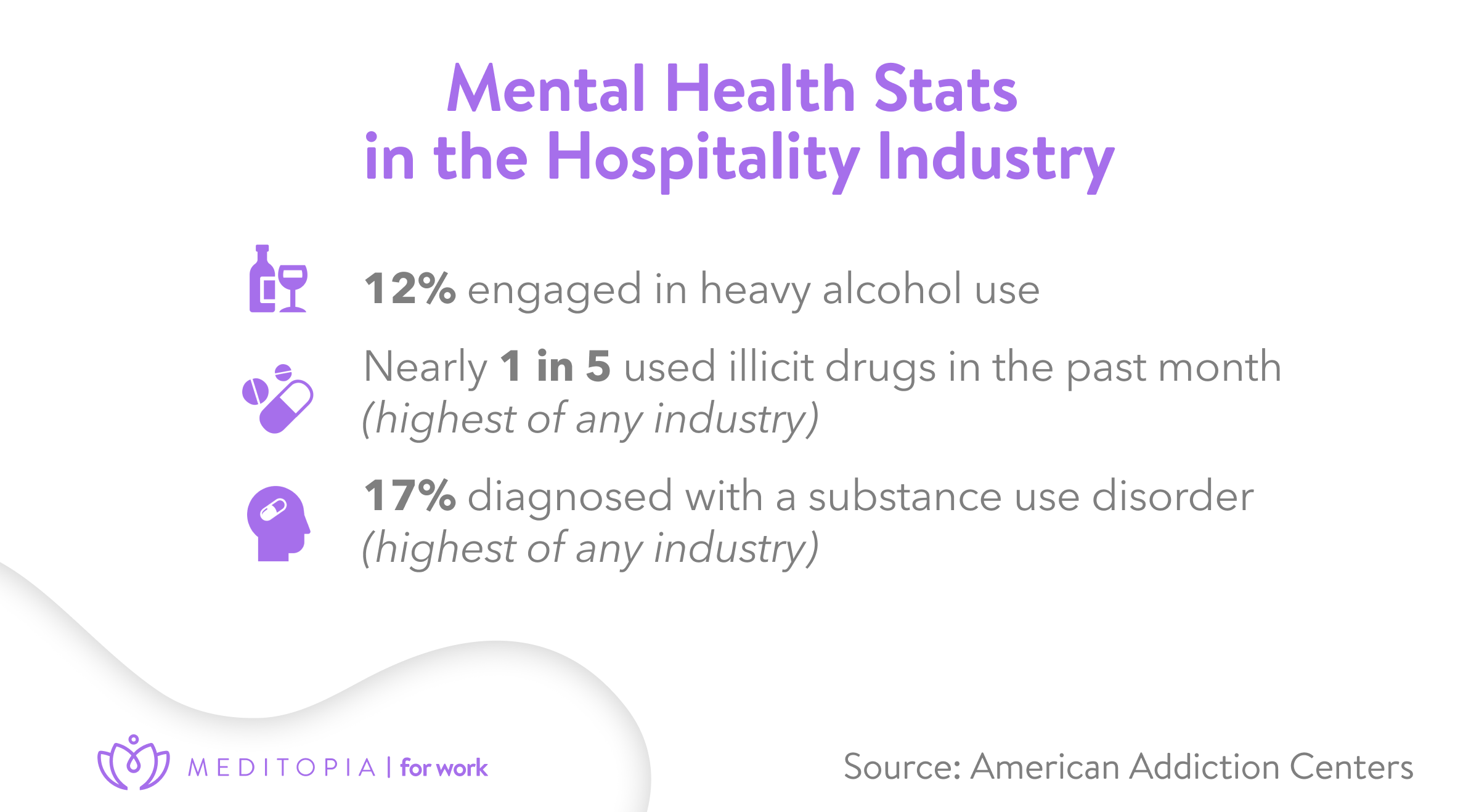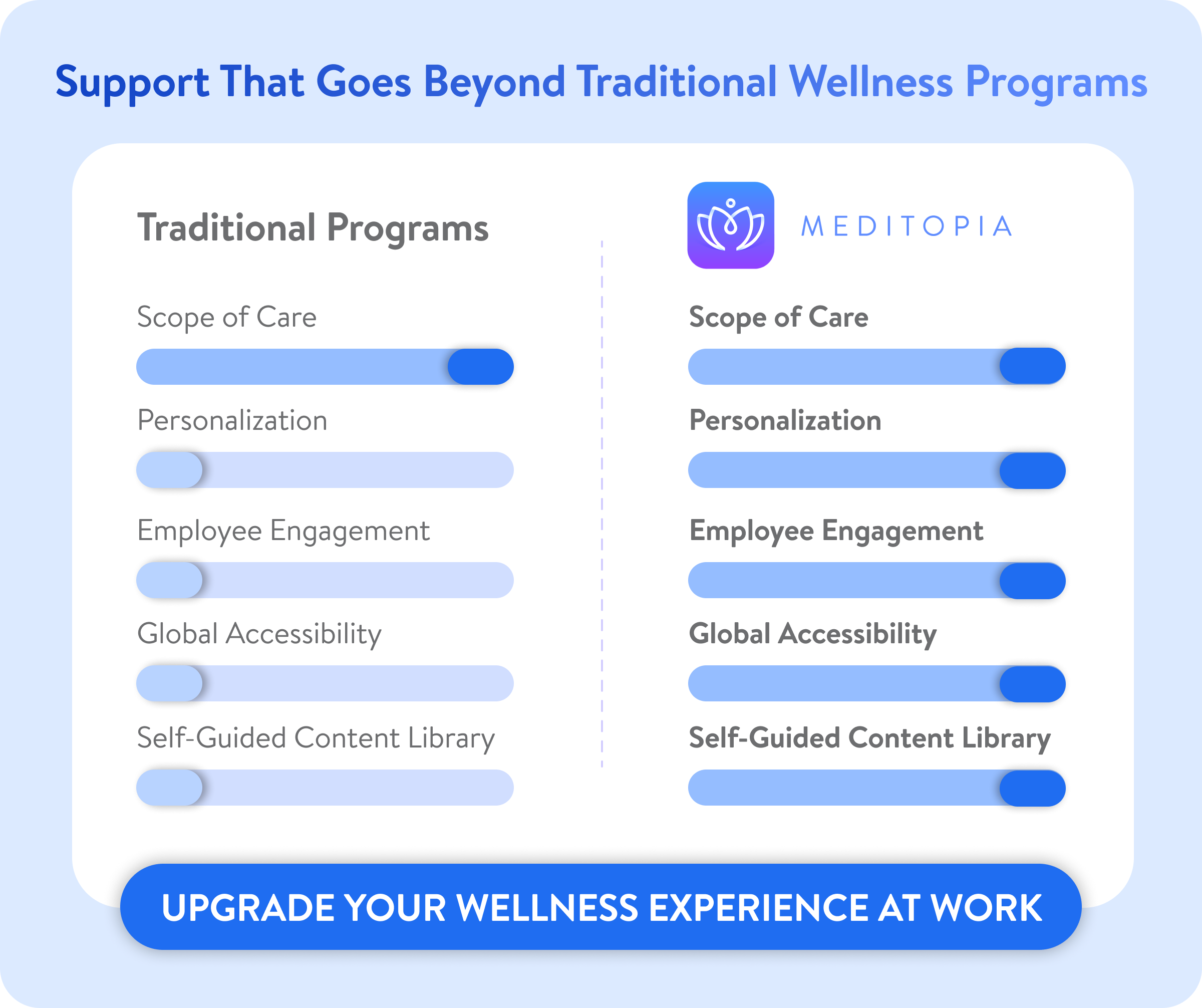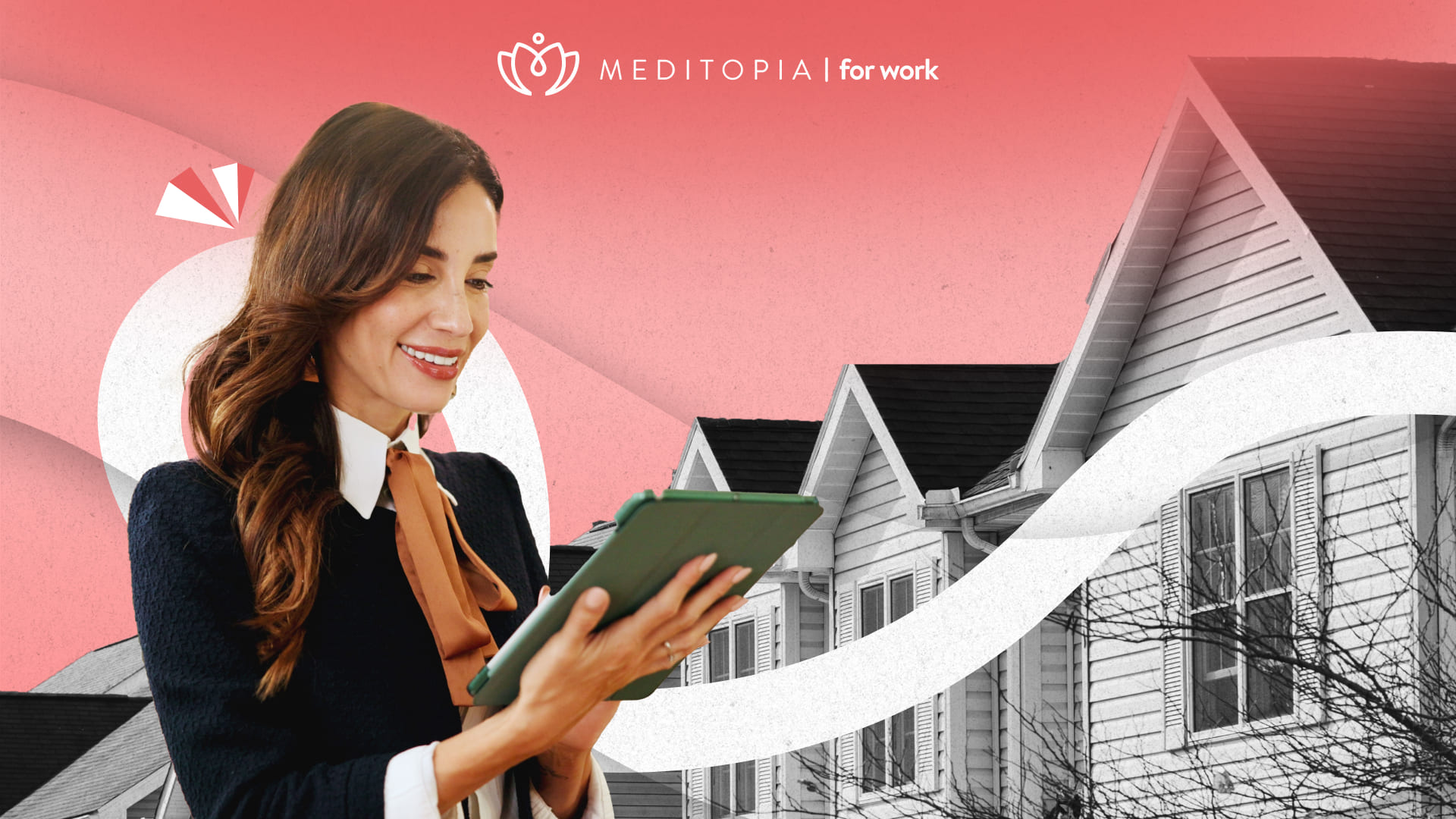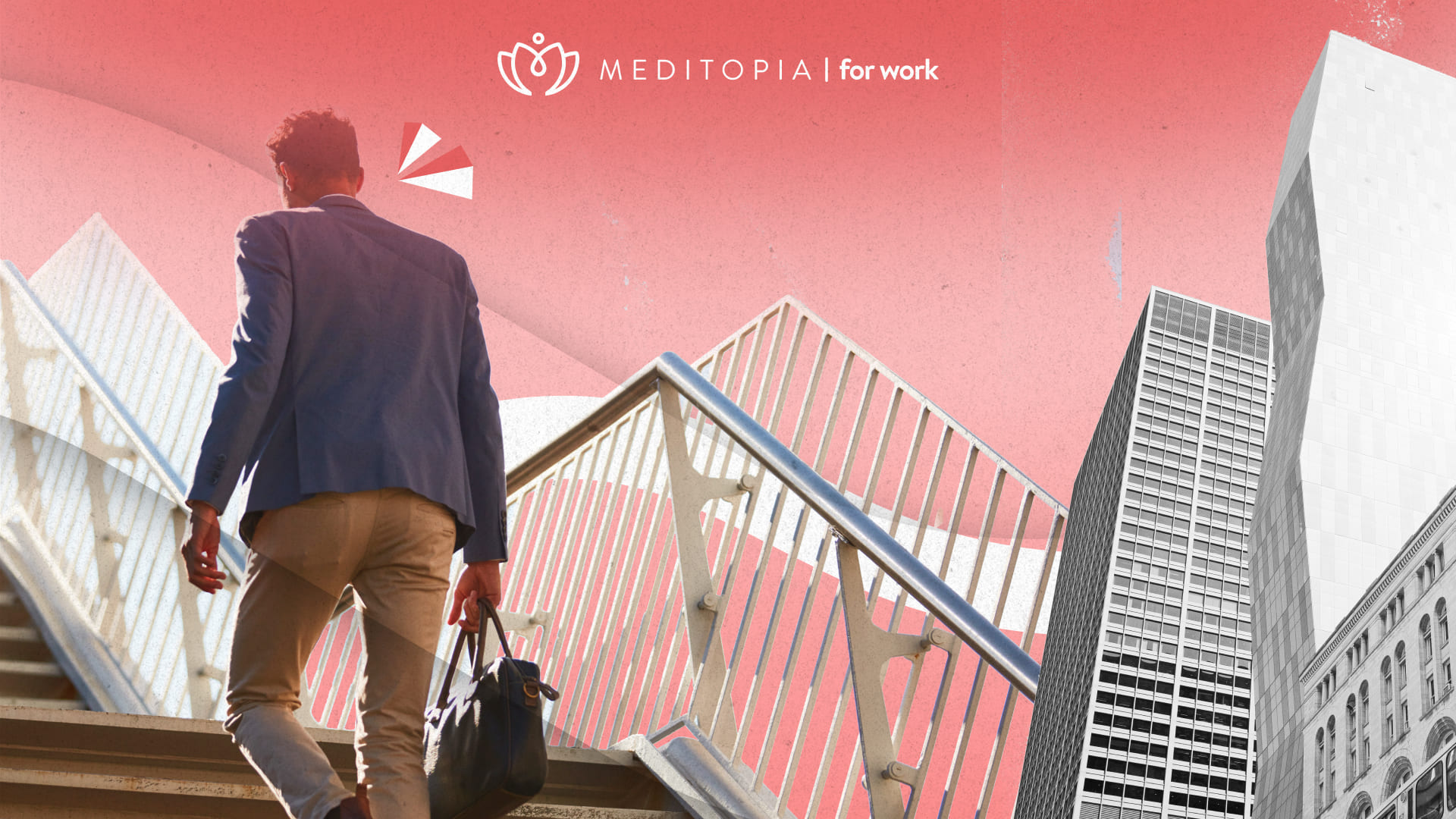Over 62% of hospitality employees report high levels of work-related stress [1]. For HR leaders, this isn’t just a health concern, it’s a business risk because high stress leads to burnout, turnover, absenteeism, and reduced guest satisfaction. An affordable and effective solution is investing in wellness programs for the hospitality industry, but how do they work? What are their unique benefits? Let's check them out.
Why Wellness Matters: Hospitality Benchmarks
Imagine delivering five-star service with a three-hour night’s sleep, back-to-back guest requests, and no time for a proper break. That’s a regular shift for many in hospitality. For HR professionals, the warning signs are clear: rising absenteeism, disengaged staff, and turnover rates that top 70% annually [2]. Without targeted hospitality wellness programs, these issues compound, hurting both morale and margins.
Here’s why a modern, industry-specific approach to wellness in hospitality is critical:
- Irregular and extended shift work disrupts sleep patterns and increases vulnerability to chronic stress and fatigue.
- Many workers lack access to digital wellness tools due to being deskless or on-the-go, limiting the reach of traditional EAPs.
- Frontline staff face emotional exhaustion from continuous guest-facing pressure, leading to disengagement and reduced workplace performance.
- Language and cultural gaps in wellness resources reduce program effectiveness in global teams.
- 47% of frontline managers report burnout, and 68% say their teams have also shared similar struggles [3].
- Broader industry insights show that 80% of hospitality professionals experience at least one mental health issue during their careers [4].
Common Mental Health & Wellness Challenges in Hospitality
Hospitality HR leaders must grapple with a uniquely demanding context where emotional labor, shift unpredictability, and high turnover converge to challenge employee wellbeing. Let's discover the most pressing mental health and wellness challenges:
- High turnover rates caused by burnout and lack of support.
- Workplace fatigue from long hours, standing shifts, and physically demanding roles.
- Emotional exhaustion from continuous guest-facing pressure.
- Low program usage due to deskless roles and poor communication channels.
- Stigma that prevents employees from using available mental health resources.
- Language and cultural barriers that make standard programs less effective.
- Limited HR capacity to implement and monitor complex wellness initiatives.

What an Effective Wellness Program Looks Like in Hospitality
To truly resonate (and drive results) a hospitality wellness program needs to be smart, agile, and empathetic to the sector's realities. Here’s what top-tier programs include:
- Mobile-first & multilingual delivery: Ensures accessibility for deskless staff across shifts and languages. In Meditopia's case, we offer therapy in 5 languages and wellbeing programs in 14 languages.
- Flexible scheduling and micro-breaks: Embeds wellness into the flow of work to reduce fatigue and stress.
- Personalized corporate challenges: Wellness programs work when they are engaging enough. That's why Meditopia crafts unique wellness challenges for your team.
- Anonymous mental health access: Lowers stigma and encourages participation. It is also a legal requirement in many countries.
- Diverse delivery formats: Including one-on-one counseling, group sessions, wellness challenges, and bite-sized content.
- CSR-aligned initiatives: Wellness programs viewed as part of corporate social responsibility significantly boost employee engagement.
- Quantified results: ROI analysis like cost-saving metrics helps secure ongoing investment. Broader workplace studies show wellness programs can yield up to $3–$6 in savings for every $1 spent, through reduced absenteeism and healthcare costs [5].
Essentially, when wellness is accessible, relevant, and embedded, it shifts from being an optional perk to a strategic driver, enhancing employee wellbeing, service quality, and business resilience.
Example Wellness Program Benefits for Hospitality
When designed effectively, these programs address urgent needs while aligning with business KPIs. Here are key benefits of tailored health and wellness hospitality strategies:
- Reduced sick days: Companies with proactive wellness programs report up to 25% fewer sick days annually [6].
- Improved morale and team cohesion: Employees in environments with visible wellness support hospitality tools report higher engagement and lower burnout.
- Boosted workplace safety: Fatigue management and mental clarity lead to fewer workplace incidents.
- Increased retention: Companies offering comprehensive wellness hospitality initiatives experience higher retention, especially among skilled food and beverage staff.
- Stronger guest satisfaction scores: Happier, healthier teams lead to better service delivery and customer experience metrics.
- Accessible, stigma-free support: Platforms offering free hospitality wellness support increase usage across all levels of the workforce.
- Enhanced employer brand: Investing in visible, scalable wellness shows a commitment to employees’ long-term wellbeing, key in recruitment and reputation building.
As you can see, in a sector where employees are the face of the brand, small investments in wellness resources for hospitality can produce outsized returns. If you're intersted in creating wellness program budget, check our specialized blog.
How Leading Hospitality Companies Approach Wellness
Seeing how top hospitality brands invest in employee wellbeing offers practical insights for HR leaders. Let's discover what other companies are doing regarding their corporate wellness.
1. Marriott International
Marriott's long-running TakeCare program delivers a holistic approach to associate wellbeing, covering physical, emotional, and social health—and more.
Key Points of the Program
- Incorporates walking breaks, fitness sessions, and dedicated relaxation spaces for associates.
- Extends beyond physical health to include financial planning, career development, team-building, recognition programs, and sustainability initiatives.
Results
- Enhanced employee engagement and elevated guest satisfaction in hotels where TakeCare is active [7].
- Strong emphasis on associate wellbeing is tied to Marriott’s 20+ consecutive years on Fortune’s "100 Best Companies to Work For" list.
2. Hilton
Hilton’s Thrive at Hilton platform and Care for All initiative serve as the foundation of their employee wellbeing strategy.
Key Points of the Program
- Thrive at Hilton offers a holistic wellness approach supporting physical, mental, and financial wellbeing.
- Introduced Wellthy in 2022: a concierge caregiving service that saves employees time and stress, delivering more than 25,000 hours of administrative relief for over 2,400 team members.
- Launched a global Care for All Hub: provides on-demand mental wellbeing content in nine languages, designed to reduce stigma and widen accessibility.
Results
- Significant reduction in administrative burden for caregivers and improved access to mental health support [8].
- Streamlined EAP access, expanded provider network and reduced average wait times to 1 day, with behavioral health visit copays as low as $5.
3. Kimpton Hotels
Kimpton, recognized for its care-centric culture, partnered with Talkspace to bring accessible and confidential therapy to its team.
Key Points of the Program
- Provided free, unlimited therapy for all employees
- Introduced a Managing Mental Health guide to help leaders support team members struggling with mental wellbeing.
Results
- Strong positive cultural impact, employees report a deep sense of belonging and emotional safety: “I have never in my life truly felt like I belonged to a team where I work…” [9].
The Future of Wellness in Hospitality
The hospitality sector is increasingly embracing next-gen technologies to make wellness accessible, scalable, and effective across diverse, deskless, and shift-based teams:
- AI-driven mental health support: AI tools are now being used to personalize wellness content, detect early signs of stress or disengagement, and offer real-time emotional assistance.
- These features are particularly useful for shift workers who may not engage with traditional EAP programs.
- Wearables for fatigue and recovery monitoring: Devices like Fitbit, WHOOP, and Apple Watch are being explored in hospitality wellness programs to track sleep, heart rate variability, and stress levels.
- Mobile-first wellness platforms: For a workforce that’s constantly on the move, mobile apps allow for flexible, anytime access to short-form meditations, breathing exercises, and even therapy.
- This delivery method is critical for frontline staff who lack access to desktops or traditional communication tools.
- Multilingual, culturally inclusive design: With hospitality teams often spanning nationalities and languages, wellness apps like Meditopia are increasingly designed with multilingual capabilities and culturally relevant content, ensuring equity in wellness access.
- Real-time analytics for HR: Advanced dashboards help HR teams monitor usage trends, engagement rates, and stress indicators, allowing proactive interventions and strategic improvements in workforce wellbeing.
Meditopia for Work: Wellness That Fits Hospitality
Meditopia for Work is designed for industries like hospitality where burnout, shift fatigue, and emotional pressure are everyday realities. Unlike generic platforms, Meditopia’s wellness experience is built around the rhythms and constraints of hospitality professionals.

Here’s how Meditopia helps HR leaders solve their biggest challenges regarding employee wellbeing in hospitality:
- 24/7 mobile access: Ensures support is always available, before, during, or after a shift.
- 14 languages for global accessibility: Crucial for international teams in hotels, resorts, and food service chains.
- Culturally relevant, industry-specific content: Workshops, webinars, and talks that support mental wellness in hospitality with real-world applicability.
- Anonymous usage and burnout tracking: Encourages employees to seek support early to reduce the negative consequences of stress, and without stigma.
- Automated onboarding and dashboards: Takes pressure off limited HR staff, making implementation effortless.
- Short-form exercises and guided meditations: Designed to fit into even the busiest workday. Including practices for absolute beginners and veterans.
- 1:1 therapy sessions: For deeper support when needed, available in local languages and culturally safe formats.
By blending convenience with compassion, Meditopia helps companies build a healthier hospitality workforce; one that thrives under pressure and delivers exceptional mental health support for hospitality workers.
Explore Employee Wellness Programs Across Industries
Employee wellness isn’t one-size-fits-all—it shifts with the unique pressures of each industry. Discover how different sectors approach wellbeing and what’s shaping the landscape today.

























